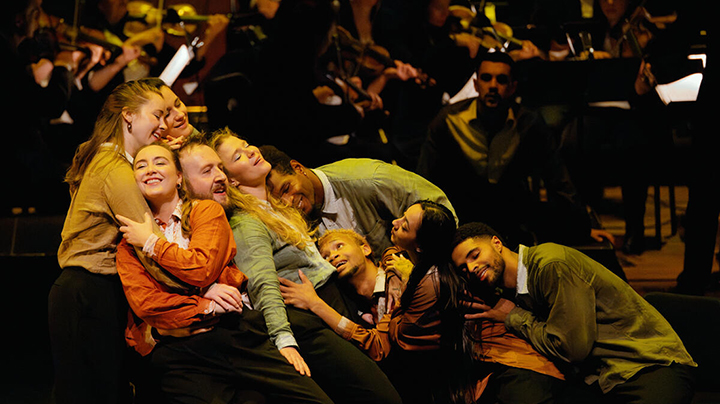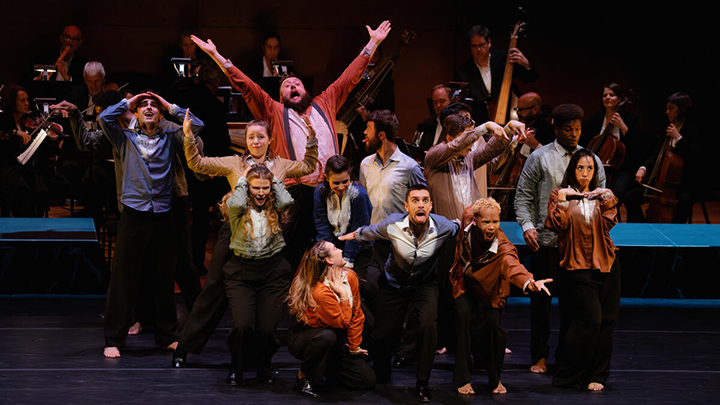Once upon a time, Les Arts Florissants appeared here regularly but those visits have become rarer and rarer. Similarly, a seismic shift away from programming classical music has recently taken place at Lincoln Center, so an exceptionally eager crowd arrived at Alice Tully Hall on 2 November to revel in a semi-staged presentation of Henry Purcell’s The Fairy Queen directed and choreographed by Mourad Merzouki and led by Paul Agnew in place of LAF’s founder William Christie. Since he was in Stockholm conducting Ann Hallenberg, I’ll forgive his absence.
More than twenty years ago, LAF began its own young artist academy called Le Jardin des Voix, and The Fairy Queen’s eight vocalists represent the eleventh edition of this mission. In its early years, the group of singers would tour the world in miscellaneous programs accompanied by the expert LAF orchestra. However, it was decided several years ago that a single work would instead become the focus; the first was Mozart’s La Finta Gardiniera, followed by Handel’s Partenope. For 2023-24, Purcell’s magical incidental music for Shakespeare’s A Midsummer Night’s Dream is being toured. I’ve just read that the next lucky group will tackle two short operas by Charpentier, as well as Alessandro Scarlatti’s Il Giardino di Rose.
In addition to the singers, for Fairy Queen six dancers were added to the mix, four from Merzouki’s group Compagnie Käfig plus two from the Juilliard School. The stage at Tully Hall was considerably extended so there was a large performing area in front of Agnew’s band of twenty-three. The singers and dancers were dressed in similar simple garb by Claire Schirck and the two groups interacted throughout the performance with the singers sometimes joining in the dancing while the dancers sang along during the final chorus.
This was the third time I’ve heard LAF do The Fairy Queen, each presented in a very different way. In 1992 at Alice Tully Hall, an ideal crew of soloists—Véronique Gens, Sandrine Piau, Claron MacFadden, Mark Padmore, Bernard Deletré, and Jérôme Corréas—were “assisted” by a narration by Jeremy Sams linking the many Purcell numbers. Though the cast is somewhat different, LAF’s recording of Fairy Queen from around that time remains by favorite.
Nearly twenty years later, the Brooklyn Academy of Music imported Jonathan Kent’s bloated Glyndebourne production accompanied by LAF rather than by the Orchestra of the Age of Englightenment which can be heard on the inessential Glyndebourne DVD. Though the musical side of the show is fine, acres of overdone Shakespeare sink that very expensive yet very tacky enterprise.
Merzouki’s production didn’t attempt to connect the music to Shakespeare at all. In fact, he chose to simply stage each number with his vibrantly energized dancers “accompanying” the singers. If his hiphop-flavored choreography looked familiar to me, it’s because I’d seen the richly imaginative LAF production of Rameau’s Les Paladins in Paris in 2004 and again in 2006. It was so much fun I had to go back—a real shame that it wasn’t brought to BAM. THAT DVD is a must-have.
The more recent and controversial Les Indes Galantes again by Rameau at the Paris Opéra also featured extravagantly exciting break-dancing.
Merzouki’s dancers were often exhilarating but the nonstop stage motion soon grew wearying particularly when the music instead sought calm and repose.
Over the years, Jardin des Voix has introduced many important baroque singers to the world; Sonya Yoncheva might be seen as an exception to the rule who other than an occasional excursion back to Monteverdi and Handel has moved on to later music and greater fame.
It’s always difficult to predict who might become a baroque étoile like Christophe Dumaux, Stéphanie d’Oustrac, Xavier Sabata, or Zachary Wilder who will appear later this month at the Morgan Library with I Gemelli, but Juliette May was this edition’s anointed performer as she was awarded two of Purcell’s loveliest pieces, “The Plaint” and “See, even Night herself is here.” Though labeled a mezzo, a radiant May sweetly spun high notes that made one eager to hear her again.
Unfortunately Lincoln Center likes to skip printing programs for its presentations, but the online information was skimpy at best: nothing at all about Purcell or The Fairy Queen, just a list of performers and biographies of only Agnew and Merzouki. I was surprised to see May and Georgia Burashko and Rebecca Leggett listed as mezzos, with Paulina Francisco the sole soprano. They all sounded like sopranos to me, slightly different from each other but all adept at putting across Purcell’s often florid music in clear, meaningful English. Rodrigo Carreto brought a pleasingly agile tenor to “Come all ye songsters,” while baritone Benjamin Schilperoort intoned “Hush, no more” with grave authority. The usually surefire comic wooing of Mopsa by Coridon fell rather flat despite the best efforts of tenor Ilja Aksionov (in unconvincing drag) and baritone Hugo Herman-Wilson, though the latter was heard to better effect as the drunken poet.
Despite an uncertain overture, the LAF orchestra provided ravishing accompaniment to the enviably energetic singers and dancers. Sometimes orchestra members were invited into the action as Sébastien Marq and Nathalie Petibon sweetly piped their recorders and Augusta McKay Lodge stepped up to eloquently accompany Kay’s poignant “Plaint” on her violin. Occasionally Agnew’s swift tempi left everyone a bit breathless, but most numbers felt just right, including one of Purcell’s very best “bops.”
The occasional tentativeness heard in the first half disappeared and the concluding numbers were such pleasure that even a surfeit of break-dancing seemed delightful. The ecstatic sold-out crowd roared its gratitude at attending the only US stop on a world tour that began in August at absent-Christie’s luxurious gardens in Thirè and concludes at the end of June 2024 at La Scala.
Music Before 1800, one of New York’s most consistently rewarding series, is under new leadership. After forty-eight years at Corpus Cristi Church in Morningside Heights, Louise Basbas has turned over the reins to Bill Barclay whose first season highlights French early music. On October 29, La Poème Harmonique led by theorbist Vincent Dumestre offered “Music for a Young King” (Louis XIV, that is) featuring mezzo Eva Zaïcik, one of the many graduates of Le Jardin de Voix.
I first heard Dumestre’s group in a superb candlelit performance of Couperin’s divine Leçons de Ténèbres in 2012 at St. Mary the Virgin (aka Smokey Mary’s) in the theater district. Their MB1800 program was instead decidedly secular focusing on native music that might have been heard by the young king at court, followed by Italian music imported to Paris at the insistence of Cardinal Mazarin, the king’s advisor.
An announcement was made that Zaïcik was a bit under the weather and it was true that her opening Lully monologue “Plainte de Vènus sure la mort d’Adonis” did not show her at her best. However, she soon was pouring out round and full ruby tones in Charpentier’s noble Air sur des stances du Cid, a powerful setting of verses from Corneille’s play. The dark richness of Zaïcik’s voice and the cozy acoustic of Corpus Cristi Church may have blurred her diction as her French was not especially clear, nor was the Italian that followed. After her “classical” selections, she turned to two “popular” French songs which proved only mildly interesting curiosities, especially “Le bossu maumariè,” a rollicking anonymous air recounting marriage to a hunchback.
To give his singer a short break, Dumestre explained that the program’s second half would segue into Italian music including several wildly different instrumental pieces by Marco Uccellini in which his small group of six filled the church with scintillating bravura. But the highlight of the afternoon turned out to be Zaïcik’s three arias from Francesco Cavalli operas.
She began with a chilling rendition of Medea’s awesome incantation from Giasone in which she summoned demons to destroy her faithless lover. A more sedate excerpt from Xerse (set to a libretto very similar to the one serving Handel’s better known version) followed, and then Zaïcik ended with a beloved Cavalli specialty–a searing lament—hers from L’Egisto. She conjured a burning anguish seconded by her intense collaborators and dispelled any notion that she was at less than her very best.
It’s too bad that she doesn’t take part in Dumestre’s very fine new complete recording of L’Egisto on the Château de Versailles label.
After a demanding program, Zaïcik rewarded those cheering with a most surprising and generous encore that skipped into the mid-18th century: Dejanira’s thrilling “Where shall I fly?” from Handel’s Hercules. She returned to her Medea-mode for a furious, yet pathetic glimpse into a mind driven mad by jealousy. Curiously her English words here were the clearest of the day.
To enjoy baroque Zaïcik at home, check out her recent “Royal Handel” CD on the Alpha label.
As the crowd wouldn’t let the visitors go, they leapt even further into the future for a HIP-y version of “La Javanaise,” a Serge Gainsbourg pop song from the 1960s.
There’s more French early music in store over the remainder of MB1800’s season including The Chevalier, a theatrical production about Joseph Boulogne, Chevalier de Saint-Georges performed at the beautifully restored United Palace in Washington Heights.
Photos: Lawrence Sumulong





